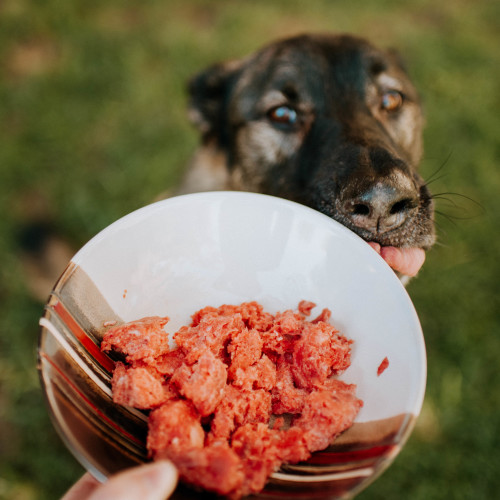A raw food diet for your German Shepherd aims to replicate what dogs evolved to eat in the wild, consisting of meat, bone, offal, and a small amount of plant ingredients, each providing essential vitamins and minerals. This comprehensive guide will provide all the information you need to know about feeding your German Shepherd a raw food diet.
From the best types of meat to feed, to the recommended portion sizes, and tips on getting started, this guide is a valuable resource for any German Shepherd owner looking to provide their dog with a natural and nutritious diet.
Ensure the health and well-being of your German Shepherd with a raw food diet.
Introduction To Raw Food Diet For Your German Shepherd
Discover the benefits of a raw food diet for your German Shepherd with our comprehensive guide. Learn how to provide your furry friend with a balanced meal plan consisting of meat, bone, offal, and a small amount of plant ingredients, ensuring they receive the essential vitamins and minerals they need to thrive.
What Is A Raw Food Diet?
A raw food diet for your German Shepherd is an approach to feeding that aims to mimic the natural diet of wolves and wild canines. It consists of feeding your dog raw, unprocessed, and biologically appropriate foods such as meat, bones, offal, and a small amount of plant ingredients. This diet focuses on providing your German Shepherd with the essential nutrients they need to thrive, promoting a healthy coat, strong bones, and optimal energy levels.Benefits Of A Raw Food Diet For German Shepherds
There are several benefits to incorporating a raw food diet into your German Shepherd’s feeding routine. These benefits include: 1. Improved Digestion: Raw food is closer to what dogs naturally consume in the wild, making it easier for their digestive system to process. It can help alleviate digestive issues such as bloating, gas, and constipation. 2. Enhanced Dental Health: Chewing on raw meaty bones can help keep your German Shepherd’s teeth clean and healthy. The act of gnawing on bones helps remove plaque and tartar buildup, reducing the risk of dental diseases like gingivitis and periodontal disease. 3. Optimal Weight Control: A raw food diet promotes a healthy weight for your German Shepherd. It provides them with the right balance of nutrients and allows for better portion control, preventing obesity or underweight issues. 4. Increased Energy Levels: Raw food is highly nutritious, providing your German Shepherd with the essential vitamins, minerals, and enzymes they need for optimal health and energy. Many pet owners report their dogs having increased energy levels and overall vitality on a raw food diet. 5. Improved Skin and Coat: Raw food diets are rich in essential fatty acids, such as Omega-3 and Omega-6, which promote healthy skin and a shiny coat. Feeding your German Shepherd a raw food diet can help alleviate skin allergies, itching, and dryness. 6. Stronger Immune System: The natural enzymes and antioxidants present in raw food can strengthen your German Shepherd’s immune system, making them more resistant to diseases and infections. 7. Reduced Allergies and Sensitivities: Many dogs with food allergies or sensitivities show improvement when switched to a raw food diet. By eliminating common allergens found in commercial dog food, such as grains and artificial additives, you can help alleviate your German Shepherd’s allergy symptoms. It is important to note that before you transition your German Shepherd to a raw food diet, it is advisable to consult with your veterinarian. They can provide guidance specific to your dog’s individual needs and ensure a smooth and successful transition to this new feeding approach.
Credit: www.wefeedraw.com
Choosing The Right Ingredients
Choosing the right ingredients is crucial when following a raw food diet for your German Shepherd. This comprehensive guide emphasizes the importance of including meat, bone, offal, and a small amount of plant ingredients to provide the essential vitamins and minerals for a balanced meal.
Give your German Shepherd the best nutrition with carefully selected ingredients.
Meat Sources For German Shepherds
German Shepherds thrive on a raw food diet rich in high-quality meat sources. When choosing meat for your furry friend, opt for options such as beef, chicken, turkey, and lamb. These meats are not only highly palatable but also provide essential proteins that support muscle growth and development. Moreover, they are easily digestible for your German Shepherd’s sensitive stomach. It is important to ensure that the meat you choose is fresh and of high quality to prevent any potential health issues for your beloved pet. Remember, the better the meat source, the more nutrients your German Shepherd will receive.Importance Of Including Bones And Offal
In addition to meat, bones and offal are crucial components of a raw food diet for German Shepherds. Bones, such as raw chicken necks or beef marrow bones, provide essential nutrients like calcium and phosphorus, which are essential for maintaining strong bones and teeth. Moreover, bones offer mental stimulation and contribute to dental health by naturally cleaning your dog’s teeth. Offal, which refers to organ meats like liver and kidney, is packed with vitamins and minerals, including vitamin A, iron, and zinc. These nutrients are essential for your German Shepherd’s overall well-being and contribute to a healthy immune system. Make sure to include both bones and offal in your German Shepherd’s diet to provide a well-rounded and balanced meal.Adding Plant Ingredients In Moderation
While meat, bones, and offal form the foundation of a raw food diet for German Shepherds, it is also important to include plant ingredients in moderation. Vegetables such as carrots, broccoli, and spinach provide essential fiber, vitamins, and antioxidants. They can aid in digestion and promote overall digestive health for your German Shepherd. However, it is important to remember that dogs are primarily carnivores, and their bodies are designed to digest and absorb nutrients from animal-based sources. Therefore, while plant ingredients can be beneficial, they should not make up a large percentage of your German Shepherd’s diet. Adding a small amount of plant ingredients, such as a handful of leafy greens, ensures a well-rounded and nutritious meal for your furry friend. Remember, moderation is key when it comes to including plant ingredients in your German Shepherd’s diet.Feeding Guidelines For German Shepherds
The comprehensive guide to a raw food diet for your German Shepherd provides essential feeding guidelines, emphasizing the importance of incorporating meat, bone, offal, and a small amount of plant ingredients. This diet replicates what dogs evolved to eat in the wild, ensuring highly beneficial vitamins and minerals for your German Shepherd’s health and well-being.
Determining The Right Amount Of Food:
When it comes to feeding your German Shepherd a raw food diet, it’s crucial to determine the right amount of food to provide. The portion size should be based on your dog’s weight, age, activity level, and metabolism. A general guideline is to feed 2-3% of your dog’s body weight, but it’s essential to monitor their weight and adjust the portion as needed.Frequency Of Feeding:
German Shepherds typically thrive on two meals per day, but some dogs may do well with one large meal or multiple smaller meals. It’s essential to establish a feeding routine and stick to it. This regular schedule helps with digestion and prevents overeating or underfeeding. Remember to consider your dog’s individual needs and consult with your veterinarian to determine the best feeding frequency for your German Shepherd.Transitioning To A Raw Food Diet:
Transitioning your German Shepherd to a raw food diet should be done gradually to prevent digestive upset. Start by introducing a small amount of raw food alongside their regular diet and gradually increase the raw food portion while reducing the previous food. This transition period typically takes around 7-10 days, but it may vary for each dog. Keep a close eye on your German Shepherd during this period to ensure they adjust well to the new diet. In conclusion, determining the right amount of food, establishing a feeding frequency, and transitioning gradually are vital aspects of feeding guidelines for German Shepherds on a raw food diet. By following these guidelines and monitoring your dog’s weight and overall health, you can ensure they receive the nutrition they need for a healthy and thriving life.
Credit: www.amazon.com
Recommended Brands And Products
When it comes to feeding your German Shepherd a raw food diet, choosing the right brands and products is essential for their overall health and well-being. In this section, we will explore the top raw food brands for German Shepherds and compare freeze-dried vs. frozen raw food options.
Top Raw Food Brands For German Shepherds
If you are looking for high-quality raw food options for your German Shepherd, these top brands come highly recommended:
- Blue Ridge Raw Frozen Dog & Cat Food: This brand offers a wide range of raw food options specifically formulated for German Shepherds, ensuring they receive a balanced diet.
- Open Farm Freeze Dried Raw Grass-Fed Beef Recipe: This freeze-dried raw food option is made with grass-fed beef, providing your German Shepherd with all the nutrients they need for optimal health.
- Steve’s Real Food Frozen Dog Food: Steve’s Real Food offers a variety of frozen raw food options that are perfect for German Shepherds. Their recipes are packed with essential nutrients and made with high-quality ingredients.
- Ultimate Pet Nutrition Freeze Dried Raw Dog Food: This freeze-dried raw food is made with premium ingredients and comes in convenient portions, making it easy to feed your German Shepherd a balanced diet.
- Open Farm Homestead Turkey Freeze-Dried Raw Dog Food: Made with humanely raised turkey, this freeze-dried raw food is rich in protein and essential nutrients, supporting your German Shepherd’s overall health.
Freeze-dried Vs. Frozen Raw Food Options
When it comes to choosing between freeze-dried and frozen raw food options, both have their advantages:
| Freeze-Dried Raw Food | Frozen Raw Food |
|---|---|
|
|
Both options offer a convenient and nutritionally balanced way to feed your German Shepherd a raw food diet. Ultimately, the decision comes down to personal preference and what works best for you and your furry friend.
Addressing Common Concerns
Discover the benefits of a raw food diet for your German Shepherd with our comprehensive guide. Learn how to mimic a prey animal’s body with muscle meat, liver, kidney, and nutrient-packed ingredients. Get started on providing a nutritious and balanced meal for your furry friend.
Maintaining A Balanced Diet
Ensuring that your German Shepherd’s raw food diet is balanced is crucial for their overall health and well-being. To achieve this, it is important to include a variety of ingredients such as meat, bone, offal, and plant ingredients in their meals. Each of these components provides essential vitamins, minerals, and nutrients that contribute to a balanced diet. It’s important to note that the ratios and amounts of each ingredient may vary depending on your dog’s individual needs. Consulting with a veterinarian who specializes in raw feeding can help you tailor a diet plan that meets your German Shepherd’s specific requirements.Safety Considerations For Raw Feeding
While the raw food diet can provide numerous health benefits, it is essential to follow safety guidelines to avoid any potential risks. Here are some safety considerations to keep in mind:- Source high-quality ingredients from trusted and reputable suppliers. This ensures that the raw food is safe, fresh, and free from harmful bacteria.
- Practice proper hygiene during meal preparation. Clean and disinfect all surfaces, utensils, and containers used for handling raw food to prevent cross-contamination.
- Thaw frozen raw food safely. Thawing in the refrigerator or using cold water is recommended to avoid bacterial growth.
- Monitor your dog closely while eating. Avoid leaving raw food out for extended periods, as it may spoil and pose a health risk.
- Introduce new ingredients gradually to prevent digestive upset and food sensitivities.
Consulting With A Veterinarian
Seeking guidance from a veterinarian who is knowledgeable about raw feeding is essential for the well-being of your German Shepherd. They can provide valuable insight and help formulate a tailored diet plan that meets your dog’s specific nutritional needs. Regular consultations with a veterinarian also ensure that any concerns or health issues are addressed promptly, promoting the overall health and longevity of your beloved canine companion. Remember, a well-balanced raw food diet, combined with professional veterinary care and regular check-ups, is the key to keeping your German Shepherd healthy and thriving. By addressing common concerns such as maintaining a balanced diet, following safety considerations, and consulting with a veterinarian, you can provide the best care for your German Shepherd and support their overall health and well-being. Implementing these practices will give you peace of mind knowing that you are making informed decisions about your pet’s nutrition and ensuring they receive the best possible care.
Credit: www.bellaandduke.com
Frequently Asked Questions Of Raw Food Diet For Your German Shepherd: A Comprehensive Guide
What Is Best Raw Diet For A German Shepherd?
A raw food diet with meat, bone, offal, and a small amount of plant ingredients is best for a German Shepherd.
How Much Raw Food Should A German Shepherd Eat Per Day?
A German Shepherd should eat a raw food diet that includes meat, bone, offal, and a small amount of plant ingredients. This diet aims to replicate what dogs naturally eat in the wild and provides essential vitamins and minerals.
What Meat Is Best For German Shepherd?
The best meat for a German Shepherd is raw meat, bone, offal, and a small amount of plant ingredients.
What Is The Best Food For German Shepherds?
The best food for German Shepherds is a raw food diet that includes meat, bone, offal, and a small amount of plant ingredients. This diet replicates what dogs evolved to eat in the wild and provides highly beneficial vitamins and minerals.
Conclusion
To ensure optimal health and nutrition for your German Shepherd, a raw food diet is a fantastic option. By replicating what dogs would consume in the wild, you will provide them with essential vitamins, minerals, and a well-balanced meal. Incorporating meat, bones, offal, and a small amount of plant ingredients is crucial.
This comprehensive guide has equipped you with the knowledge and resources necessary to get started on this raw feeding journey with your beloved German Shepherd. Embrace this natural and nourishing approach to feeding and see the positive impact it has on your furry friend’s well-being.








